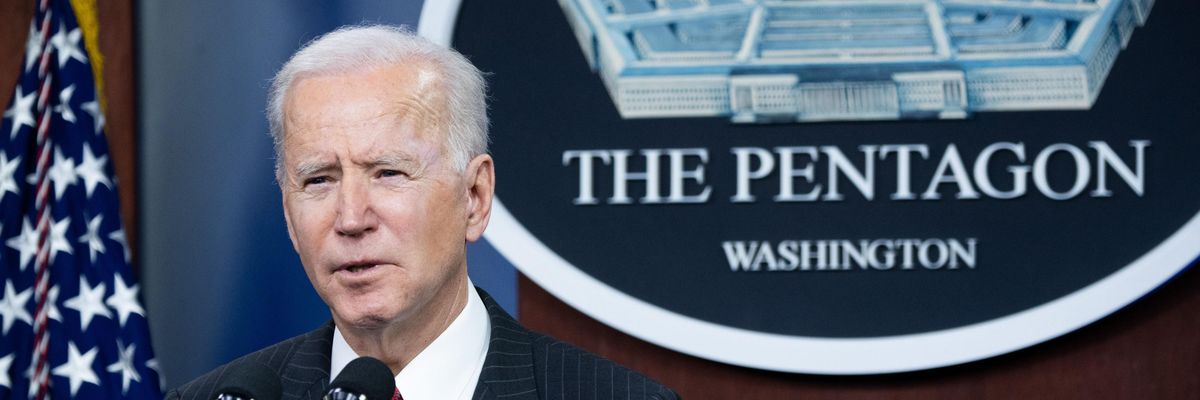The U.S. military's latest bombing campaign in Iraq and Syria on Sunday was met with fresh demands for the immediate withdrawal of American forces from both Middle East countries, as the Biden administration attempted to justify the airstrikes as "defensive" in nature.
"This constant cycle of violence and retribution is a failed policy and will not make any of us safer."
--Rep. Ilhan Omar
The Pentagon said in a statement Sunday evening that, under the direction of President Joe Biden, the U.S. military bombed "facilities used by Iran-backed militia groups" on both sides of the Iraq-Syria border, airstrikes that Defense Department Press Secretary John Kirby claimed were "designed to limit the risk of escalation."
"Know what would actually be deescalatory? Leaving Iraq," responded Stephen Miles, executive director of U.S.-based advocacy group Win Without War.
The Sunday airstrikes represented the second time Biden has ordered the bombing of targets in Syria with the stated goal of deterring so-called Iran-backed militias that the U.S. says were behind recent drone attacks on American forces in the region. The Biden administration's previous strikes, carried out in February, drew sharp criticism from progressive lawmakers, who characterized the attacks as unconstitutional because they were launched without congressional approval.
Rep. Ilhan Omar (D-Minn.) offered a similar critique of the new round of bombing. "This constant cycle of violence and retribution is a failed policy and will not make any of us safer," she wrote on Twitter. "Congress has authority over War Powers and should be consulted before any escalation."
House Speaker Nancy Pelosi (D-Calif.), for her part, readily accepted the Biden administration's self-defense narrative and said that "Congress looks forward to receiving and reviewing the formal notification of this operation under the War Powers Act and to receiving additional briefings."
Roughly 2,500 U.S. troops remain stationed in Iraq nearly 20 years after the Bush administration's catastrophic and illegal invasion of the country in 2003. The U.S. is also maintaining a presence of around 900 troops in Syria, despite longstanding questions over the legality of the military's operation there.
In an effort to give Sunday's airstrikes a legal veneer, the Pentagon said Biden "took this action pursuant to his Article II authority to protect U.S. personnel in Iraq," a reference to Article II of the U.S. Constitution--which previous administrations have interpreted broadly to carry out military operations overseas without a green light from Congress.
Historian Gregory Brew warned that the Biden administration's use of Article II to rationalize the bombing of Iraq and Syria indicates that even full congressional repeal of the post-9/11 Authorizations for Use of Military Force (AUMFs) would not be enough to prevent the White House from launching unilateral attacks in the Middle East.
"'Forever War' gets thrown around quite a lot, but there's a strong sense that the tit-for-tat strikes between the U.S. and Iran in Syria and Iraq could extend indefinitely into the future," Brew said. "The administration's choice to justify the strikes with Article II, rather than the AUMFs, suggests the U.S. forces in Iraq will remain regardless of whether the AUMFs are revoked or not."
The new airstrikes targeting supposed Iranian proxy forces in Syria and Iraq came as the United States and Iran remain locked in tense, high-stakes negotiations over the future of the 2015 nuclear accord, which former U.S. President Donald Trump violated in 2018.
Jamal Abdi, president of the National Iranian American Council (NIAC), said in response to Sunday's airstrikes that the Biden administration's delay in jumpstarting the post-Trump nuclear talks--as well as the recent election of conservative Ebrahim Raisi to the Iranian presidency--likely means "a lot more of this dumb kind of back and forth" in the near future.
According to Syria's state-run SANA news agency, one child was killed in the U.S. bombing Sunday and at least three others were wounded after airstrikes hit a residential building.




